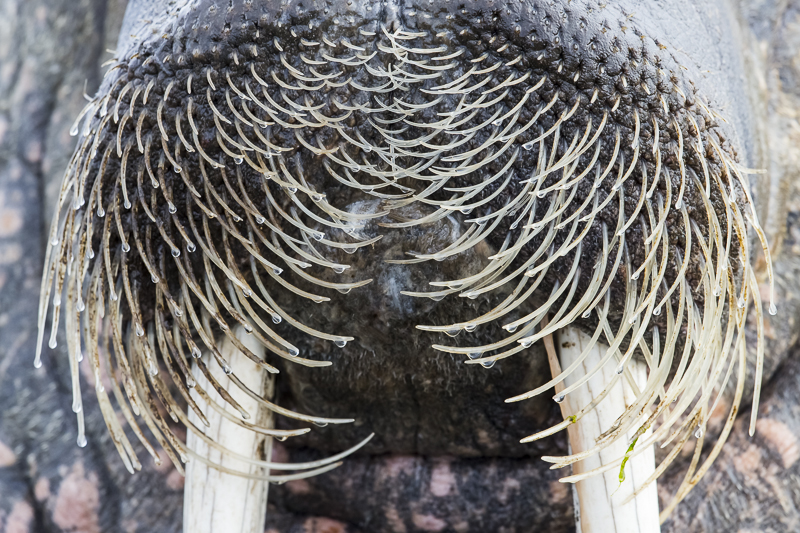Nutrition
Most food that the walrus consumes are organisms that live in benthic (bottom) regions of the sea, no deeper than about 80m (Sea World Parks and Entertainment). Benthic regions are best because they are more abundant with the types of foods that walruses eat. Their diet consists of crustaceans, worms, mollusks, octopus, may prey on fish, and sometimes dead seals if their food is limited (Sea World Parks and Entertainment).
 In
order to obtain food walruses will use their tusks to scrape the
sediment at the bottom of the sea (Sea World Parks and
Entertainment) and then use their whiskers, which are bristly
stiff hairs around their mouth, to find prey that came out of
the sediment(Baker, H. 2013). Their bristles are used to help
find food that had been dispersed from the sediment that was
scraped by the tusks.
In
order to obtain food walruses will use their tusks to scrape the
sediment at the bottom of the sea (Sea World Parks and
Entertainment) and then use their whiskers, which are bristly
stiff hairs around their mouth, to find prey that came out of
the sediment(Baker, H. 2013). Their bristles are used to help
find food that had been dispersed from the sediment that was
scraped by the tusks.
This is a photo of a walruses mouth. You can see the bristles
that are all around the mouth that help feel for their food as
well as the tusks coming out of their mouth. Both of these are
essential for the walrus to capture food.
Used with permission. Photo credit:Kurt Jay Bertels
Walruses eat twice a day, on a daily basis they'll eat around 3 to 6% of their own body weight; some males can weigh 3,700 pounds and females are around 2,700 pounds (Defenders of Wildlife. 2013; Sea World Parks and Entertainment). Walruses need a lot of food to be able to maintain their fat storage or blubber, to keep warm. The walrus has various types of food and with depends upon how they eat that certain type of food. To eat shellfish walruses will crush the shell by using their smaller teeth, these teeth are rounded teeth and inside their mouth and then eat what is inside the shell (Baker, H. 2013.). When eating mollusks, walruses use suction to eat the inside of the mollusk, the walrus use their mouth and tongue to try and open the shell then sucks out the inside (Baker, H. 2013.).
If a site for food has been depleted of food walruses will move to another location. Walruses have not been seen to die due to starvation, but there has been cases where they have been seen to be malnourished (MacCracken, J.G. 2012.).
Now you know what a walrus needs to eat in order to survive in their artic habitat. Now let's find out how they reproduce.